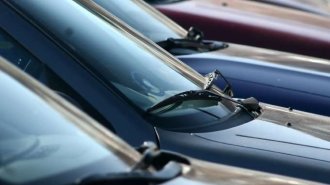
Researching auto history by VIN number is crucial for making a decision about purchasing a vehicle. Used cars are often sold as is, often with no warranty. While having a car's history report does not necessarily guarantee its future performance, it does offer peace of mind to car buyers before they pay out thousands of dollars for a car. Purchasing a used vehicle without its history report amounts to gambling. Using the VIN to pull a car history report lets you know whether a car is a good deal, or whether it has been compromised or is in less than stellar condition.
VIN stands for Vehicle Identification Number. It can be used to locate a comprehensive report on a vehicle's entire background and provide useful information about the vehicle's prognosis. The car history VIN number information can be used to decide whether an automobile should be purchased or not.
VIN number should be directly above the dashboard on the driver side in the spot where the windshield comes in contact with the top of the dashboard. If you have the vehicle's paperwork, such as its title or registration, look for its 17-digit alphanumeric VIN and write it down accurately.
There are many websites online that can help you find a vehicle's history by using its VIN number. Two leading providers are CARFAX and AutoCheck. Expect to pay about $29.95 for a single search, although some providers will let you order 10 reports for $34.99, and unlimited reports over a 30-day period for $39.99. The rates are provided here as a guide. Actual rates may vary.
Select a provider, follow the on screen prompts, and enter your contact information. Pay for your report, and submit.
Allow a few minutes for the system to compile your report. It should contain the following information: accident and salvage history, past flood or water damage, fraudulent odometer alterations, lemon car information, junk titles, past emissions inspection results, any lien information, auto thefts, what the vehicle has been used for in the past and more.
Print your report, study it, and decide whether, based on the car history VIN information, you should proceed with your purchase or not.
Before 1981, auto VINs ranged from 11 to 17 characters. Car history VIN number reports can only be provided if your VIN number is 17 characters long. If your VIN number is less than 17 characters, you may not receive a complete or meaningful report from your car history VIN number report.
One of the best ways to determine if a car is worth its price is to gain information about its history through the use of its VIN. Here are some advantages of knowing car history.
The initial benefit you'll have by running a VIN search is gaining a better understanding of the car's value. You'll know if the odometer has ever been rolled back or reported to be malfunctioning, you'll find out if the vehicle has ever suffered from flood damage, or if it's ever been reported as a lemon. Using this knowledge, you'll be better equipped to bargain with the car dealer/seller and pay a great price.
A car without previous accident history and major repairs will most likely perform better than a car that has crashed a few times and/or required significant repairs. Additionally, cars that were used as rental or commercial cars may not run as well as privately owned and operated vehicles. By learning about a car's ownership, inspection and maintenance histories, you'll have a better idea of how well the car will perform.
Cars that have had parts frequently replaced due to accidents and other problems may subject their drivers to heightened safety risks. You'll find out if the car has had issues such as previous frame damage, if the airbags have ever deployed or malfunctioned or any number of other things that may lead to increased safety risks for its passengers. Learning a car's history through its VIN will allow you to find a vehicle that meets your safety standards.
Sometimes, used cars can require more money in repairs than is worth paying. To avoid buying an expensive, repair-prone car, utilize a car history report to inform yourself of any problematic areas. Certain accidents and repairs in the vehicle's past may alert you to some issues that could cost you money in the future. Knowing the car's history before you buy it can definitely save you future costs.